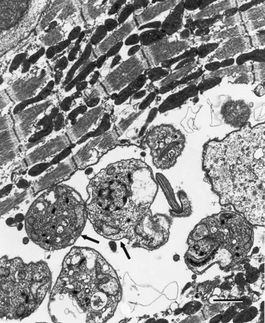US and Mexico must jointly combat Chagas disease
Chagas disease affects approximately 7.5 million people, mostly in Latin America. To help reduce outbreaks of this disease in their countries, the United States and Mexican governments should implement a range of programs as well as fund research for the development of Chagas vaccines and treatments, according to a new policy brief by tropical-disease and science policy experts at Rice University's Baker Institute for Public Policy.
"Traditionally, Chagas disease is commonly believed to afflict only the poor in rural parts of Latin America," Kirstin Matthews, fellow in science and technology policy said. "However, the migration of infected humans, animals and insects has brought the parasite causing the disease, T. cruzi, to other parts of the world, including the U.S. and Mexico. Through cross-border collaborations, the two countries' governments can take steps to reduce the risk of Chagas disease by increasing awareness among health care providers and the community to protect their most vulnerable citizens, implementing control and surveillance programs and developing novel treatments for acute and chronic Chagas disease."
T. cruzi is not normally transmitted from person to person but is spread through insects called triatomines, also known as "kissing bugs." Kissing bugs spread Chagas disease directly to humans through their feces. The term "kissing bug" is used because the triatomine usually takes a blood meal from around the face when a person is asleep outside or in a housing structure that allows the bugs to get inside. As the bug feeds, it also defecates. When the person rubs the irritated spot, they unintentionally rub the bug's feces, containing the parasite, into an open wound or into the eye. From there the parasite can enter the bloodstream.
Without treatment, some patients, mostly children and immune-compromised individuals, will progress to myocarditis (inflammation of the heart muscle) or meningoencephalitis (inflammation of the central nervous system), which can be fatal. Pregnant women with the disease can experience miscarriage and preterm labor. T. cruzi can be passed from mother to child during pregnancy, a condition known as congenital Chagas disease. This condition represents over one-quarter of the world's cases.
Other news from the department science

Get the life science industry in your inbox
By submitting this form you agree that LUMITOS AG will send you the newsletter(s) selected above by email. Your data will not be passed on to third parties. Your data will be stored and processed in accordance with our data protection regulations. LUMITOS may contact you by email for the purpose of advertising or market and opinion surveys. You can revoke your consent at any time without giving reasons to LUMITOS AG, Ernst-Augustin-Str. 2, 12489 Berlin, Germany or by e-mail at revoke@lumitos.com with effect for the future. In addition, each email contains a link to unsubscribe from the corresponding newsletter.


















































